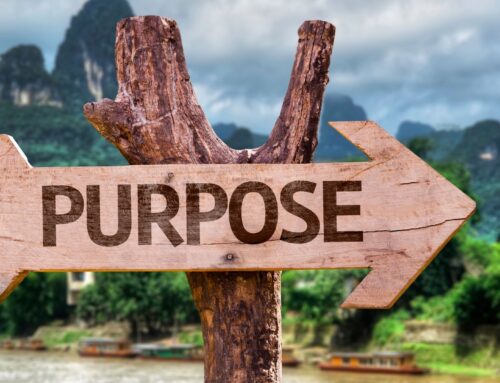The fantasy of infinite economic growth will be the death of us unless we change tack on the good ship GDP and sail towards thriving, not growing, writes Tamara Pitelen.
‘Economic growth is good!’ they said. ‘As long as we have economic growth, we’re all winning!’ they said.
So why do we have billions of people living in poverty, as well as our beautiful planetary home dying beneath our feet, from the excesses of our insatiable economic growth?
The idea that economic growth is the be all and end all; the best thing ever for all of us; has been so well and truly drummed into our collective consciousness, for so many decades, that we have swallowed it as an inalienable fact. ‘Night follows day and economic growth is good.’
But what if it’s not. What if we’ve been sold down the (polluted) river and the price we’re paying for our obsession with economic growth and its partner-in-crime, rampant consumerism, is a ruined planet, widespread poverty and inequality, oceans choked with plastic, air clogged with petrol fumes, pandemics of disease… and so on.
GROWTH BRAINWASHING
Turn on the television news on any night of the week, or read any newspaper, and the rhetoric is as follows: ‘anything that helps grow the economy is good and any drop in the economy is bad’. Which is how we’ve ended up in a world where, for example, the people of Beijing cannot breathe the air in their city and are dying of respiratory diseases (Cao, Liang, Niu. 2017), yet still Beijing is held up as a model of success, earning it the nickname the ‘billionaire capital of the world’. We seriously need to take a long hard look at our definition of ‘success’.
Of course, pursuing economic growth has delivered positives, I’m not disputing that. Since 1800 or so, the start of the industrial revolution, it has lifted millions of people out of poverty, increased literacy rates and improved life expectancy. But it’s also proven something of a Trojan horse and now, in the 21st century, we’re looking around and thinking, ‘oh, well, yes, I did want to own 20 different types of running shoe but I didn’t mean for child slaves in Asia to have to make them. And I didn’t want animals to be locked for their entire lives, in cages so small they can’t turn around, so I can have bacon sandwiches. Nor did I want great swathes of Amazonian rainforest cut down so I could eat peanut butter either…’
THE GDP MISTAKE
As part of the dominant neoclassical economic theory that arose in the 18th and 19th centuries, gross domestic product (GDP) has been held up as the golden measure of prosperity. It refers to the sum value of all the goods and services produced in a country, usually over a year.
An early version of GDP appeared in the 17th century (Wikipedia) but the modern concept was developed by American economist and statistician Simon Kuznets for a US Congress Report in 1934 that was looking at how to rebuild the US economy following the Great Depression. Even Kuznets, though, recognised the limitations of GDP and warned against using it as a measure of welfare.
“…no income measurement undertakes to estimate the reverse side of income, that is, the intensity and unpleasantness of effort going into the earning of income. The welfare of a nation can, therefore, scarcely be inferred from a measurement of national income…” wrote Kuznets (Kuznets, 1934).
This warning seemed to fall on deaf ears, however, and after the Bretton Woods conference (formally known as the United Nations Monetary and Financial Conference) in 1944, GDP became the main tool for measuring a country’s economy.
Which was fine back in the 19th century, when the world did not face the problems it does now. For the 21st century, though, we cannot look to 19th century thinking for our solutions.
THE PRICE OF CLEAN AIR
In an interview in 2019, former Unilever CEO Paul Polman said: “When GDP was invented… in the US, it was meant as a measure of industrial output. The guy who invented it… was very clear that you shouldn’t use that to measure the health of an economy. We don’t measure clear air. We don’t measure quality of education. In fact, the more wars we make, the better it is for our GDP. The oil spill of BP in the Gulf added 2.5 percentage points to the GDP of the US. But if we take care of our forests and protect them, it doesn’t get into the GDP. We have a weird definition of success. And that is why many people are looking at a concept of GDP plus.”
Economic growth was, and in many circles still is, considered essential for improving human prosperity. But this economic model is not fit for purpose. It has proven itself unstable and has woefully failed at equitably distributing the benefits of growth (CSIL, 2020). As well, it has shown that it is incapable of managing the environment on which every species requires for life. It is, in a word, unsustainable and many are now questioning whether GDP is an adequate indicator of human prosperity and wellbeing. Even the World Economic Forum states that GDP is “no longer an accurate measure of economic progress” (Kumar, 2018).
“GDP provides measurements of output, income and expenditure quite well, and these are needed to understand and devise fiscal and monetary policies. But this measure flatly fails when it comes to wellbeing,” writes Pushpam Kumar of the World Economic Forum.
So what do we do with this broken system? We fix it. As quickly as possible. How? First, by admitting that the fanciful idea that we can have limitless growth on a planet of finite and limited resources is fundamentally flawed. ‘La la la unicorns, fairies, endless economic growth!’ It’s like believing in Father Christmas for adults.
Next, we admit that we need to broaden the parameters of what something ‘costs’ and redefine the yardsticks by which we measure cost. We give planet, people, profit equal value in our assessment of ‘cost’. “A healthy economy should be designed to thrive, not grow,” says Oxford economist Kate Raworth in her 2018 TED talk.
To do this, we harness the three drivers of the economy – government, business, and financial sector – and embed sustainability into their DNA.
“Capitalism can function,” says Polman, “if we move the definition. Not only from maximising return on financial capital but if we also move it to social and environmental capital, then capitalism can function.
“So one of the things we need to do is in just redefining value as, for example, putting a price on carbon.”
We get serious about reaching global sustainability targets for 2030 and 2050 such as the United Nations 17 Sustainable Development Goals (SDGs). The SDGs provide the blueprint for achieving a better and more sustainable future for all. They address the global challenges we face, including poverty, inequality, climate change, environmental degradation, peace and justice.
In other words, we wake the hell up and sort this mess out. Can I get an ‘amen’ up in here! Amen.
Would you like some help in making the transition from ‘business-as-usual’ to a 21st century sustainable business strategy in line with the world’s race to a decarbonised economy? Get in touch with the Greener Matters team at www.greenermatters.com or email hello (at) greenermatters.com.
REFERENCES
-
Cao, Liang, Niu (2017). China’s Air Quality and Respiratory Disease Mortality Based on the Spatial Panel Model. Retrieved from <https://www.ncbi.nlm.nih.gov/pmc/articles/PMC5615618/> 16 February 2021
-
Wikipedia. GDP. Retrieved from <https://en.wikipedia.org/wiki/Gross_domestic_product>
-
Encyclopaedia Britannica editors n.d. Retrieved from <https://www.britannica.com/biography/Simon-Kuznets> on 16 February 2021.
-
Kuznets, Simon (1934). National Income 1929-34, US Bureau of Foreign and Domestic Commerce. Retrieved from https://fraser.stlouisfed.org/title/national-income-1929-1932-971 on 16 February 2021.
-
Polman, Paul, CEO Unilever (2009-2018) Recorded in an interview with Amy Edmondson on Thursday 11 April 2019 for What CEOs Say. <https://www.hsph.harvard.edu/leadership-studio/what-ceos-say/paul-polman/>
-
Kumar, P. (2018). GDP is no longer an accurate measure of economic progress. Here’s why. Retrieved from: https://www.weforum.org/agenda/2018/11/forget-gdp-for-the-21st-century-we-need-a-modern-economic-measure
-
Raworth, Kate (2018). A healthy economy should be designed to thrive, not grow. TED. Retrieved at https://youtu.be/Rhcrbcg8HBw
-
United Nations Sustainable Development Goals. Retrieved from https://www.un.org/sustainabledevelopment/sustainable-development-goals/ on 16 February 2021.






